商务英语国际贸易
国际贸易师证书考试科目

国际贸易师证书考试科目国际贸易师证书考试是一个评估专业知识和技能的重要考试。
这个证书对于想要在国际贸易领域发展的人来说,是一种重要的资格认证。
为了获得这个证书,考生需要通过一系列科目的考试,这些科目涵盖了国际贸易的各个方面。
1. 商务英语商务英语是国际贸易师证书考试的核心科目之一。
在现今全球化的商业环境中,英语已成为国际商务交流的主要语言。
掌握商务英语对于从事国际贸易工作的人来说至关重要。
商务英语科目考察考生的英语听、说、读、写的能力,以及商务用语和专业术语的掌握情况。
2. 国际贸易实务国际贸易实务是考试科目中的另一个重要科目。
这个科目考察考生在实际贸易操作中的技能和经验。
考生需要了解国际贸易的各个环节,包括贸易方式、贸易合同、国际支付、保险和运输等。
同时,考生还需要熟悉国际贸易的相关法律法规和国际贸易的风险管理。
3. 贸易法律法规贸易法律法规是国际贸易师证书考试的另一个重点科目。
这个科目考察考生对国际贸易相关法律法规的了解和应用能力。
考生需要掌握国际贸易的国际法律规范,如国际商法、国际海事法和国际仲裁等。
此外,了解和应用国内贸易法律法规也是这个科目的重点内容。
4. 国际市场营销国际市场营销是考察考生市场策略和营销技巧的科目。
在国际贸易中,了解和把握市场需求,制定有效的市场营销策略对于企业的发展至关重要。
这个科目考察考生的市场调研能力、市场定位能力以及市场推广和销售管理的能力。
5. 贸易风险管理贸易风险管理是考察考生风险识别和应对能力的科目。
贸易中存在各种风险,如汇率风险、信用风险和政治风险等。
考生需要掌握各种风险管理方法和工具,能够准确识别风险并采取相应措施进行风险管理。
6. 国际贸易操作软件应用国际贸易操作软件应用是考察考生使用贸易软件进行操作和处理的科目。
在现代贸易中,许多贸易流程都是通过电子化的贸易操作软件进行处理的。
考生需要熟悉常用的贸易软件,如进出口经营管理系统、电子商务平台和国际物流管理系统等。
商务英语词汇大全文库
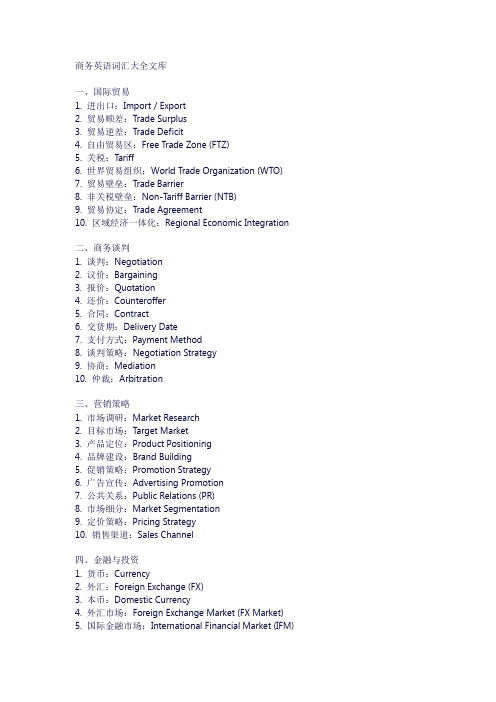
商务英语词汇大全文库一、国际贸易1. 进出口:Import / Export2. 贸易顺差:Trade Surplus3. 贸易逆差:Trade Deficit4. 自由贸易区:Free Trade Zone (FTZ)5. 关税:Tariff6. 世界贸易组织:World Trade Organization (WTO)7. 贸易壁垒:Trade Barrier8. 非关税壁垒:Non-T ariff Barrier (NTB)9. 贸易协定:Trade Agreement10. 区域经济一体化:Regional Economic Integration二、商务谈判1. 谈判:Negotiation2. 议价:Bargaining3. 报价:Quotation4. 还价:Counteroffer5. 合同:Contract6. 交货期:Delivery Date7. 支付方式:Payment Method8. 谈判策略:Negotiation Strategy9. 协商:Mediation10. 仲裁:Arbitration三、营销策略1. 市场调研:Market Research2. 目标市场:Target Market3. 产品定位:Product Positioning4. 品牌建设:Brand Building5. 促销策略:Promotion Strategy6. 广告宣传:Advertising Promotion7. 公共关系:Public Relations (PR)8. 市场细分:Market Segmentation9. 定价策略:Pricing Strategy10. 销售渠道:Sales Channel四、金融与投资1. 货币:Currency2. 外汇:Foreign Exchange (FX)3. 本币:Domestic Currency4. 外汇市场:Foreign Exchange Market (FX Market)5. 国际金融市场:International Financial Market (IFM)6. 投资组合:Portfolio7. 股票:Stocks8. 债券:Bonds9. 期货与期权:Futures & Options10. 对冲基金:Hedge Funds11. 风险投资:Venture Capital (VC)12. 私募股权投资:Private Equity (PE)。
国际贸易商务英语

国际贸易商务英语一、商务:what time would be convenient for you?你看什么时间比较方便?I'd like to suggest a toast to our cooperation.我想建议为我们的合作干一杯。
Here is to our next project!为我们下一个项目干杯!would you please tell me when you are free?请问你什么时候有空?gald to have the opportunity of visting your ompany and I hope to conclude some business with you。
很高兴能有机会拜访贵公司,希望能与你们做成交易。
what I care about is the quality of the goods.我关心的是货物的质量。
please have a look at those samples.请给我看一下那些样品。
I'd like to know any business connections abroad.我想多了解一些你们公司。
I would be happy to supply samples and a price list for you.我很乐意提供样品和价格单给你。
can I have your price list?你能给我价格单吗?will you give us an indication of prices?你可以给我报一个指示性的价格吗?I am in charge of export business.我负责出口生意。
I'm thinking of ordering some of your goods.我正考虑向你们订货。
what about the prices?那价格方面怎么样?Let's call it a deal.好,成交!our product is the best seller.我们的产品最畅销。
国际商务英语汉译英翻译
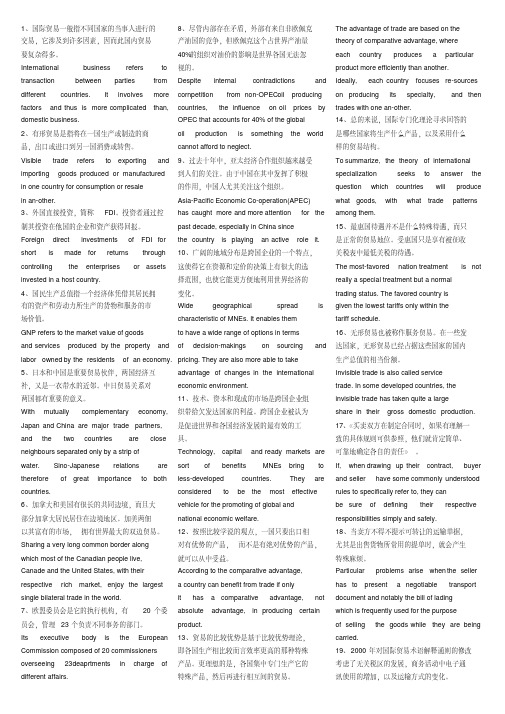
制其投资在他国的企业和资产获得回报。
past decade, especially in China since
15、最惠国待遇并不是什么特殊待遇,而只
Foreign direct investments of FDI for the country is playing an active role it. 是正常的贸易地位。受惠国只是享有被征收
即各国生产相比较而言效率更高的那种特殊
overseeing 23deaprtments in charge of 产品。更理想的是,各国集中专门生产它的
19、 2000 年对国际贸易术语解释通则的修改 考虑了无关税区的发展,商务活动中电子通
different affairs.
特殊产品,然后再进行相互间的贸易。
zones, the increased use of electronic
出口商所开出的汇票后,便可得到单据,而
conformity with those in the L/C.
communication, and the transport practices.
change in
付款则要晚于这个时间。 In the case of documents against
是促进世界和各国经济发展的最有效的工 具。
17、《买卖双方在制定合同时,如果有理解一 致的具体规则可供参照,他们就肯定简单、
neighbours separated only by a strip of
Technology, capital and ready markets are 可靠地确定各自的责任》 。
in an-other.
Asia-Pacific Economic Co-operation(APEC)
职校学商务英语好还是国际贸易好
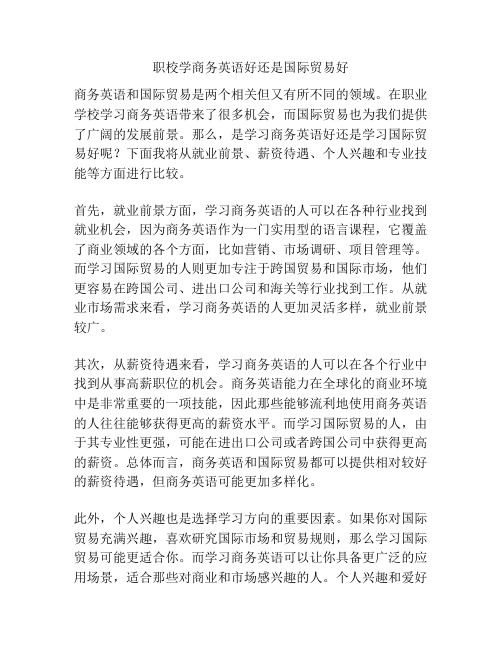
职校学商务英语好还是国际贸易好商务英语和国际贸易是两个相关但又有所不同的领域。
在职业学校学习商务英语带来了很多机会,而国际贸易也为我们提供了广阔的发展前景。
那么,是学习商务英语好还是学习国际贸易好呢?下面我将从就业前景、薪资待遇、个人兴趣和专业技能等方面进行比较。
首先,就业前景方面,学习商务英语的人可以在各种行业找到就业机会,因为商务英语作为一门实用型的语言课程,它覆盖了商业领域的各个方面,比如营销、市场调研、项目管理等。
而学习国际贸易的人则更加专注于跨国贸易和国际市场,他们更容易在跨国公司、进出口公司和海关等行业找到工作。
从就业市场需求来看,学习商务英语的人更加灵活多样,就业前景较广。
其次,从薪资待遇来看,学习商务英语的人可以在各个行业中找到从事高薪职位的机会。
商务英语能力在全球化的商业环境中是非常重要的一项技能,因此那些能够流利地使用商务英语的人往往能够获得更高的薪资水平。
而学习国际贸易的人,由于其专业性更强,可能在进出口公司或者跨国公司中获得更高的薪资。
总体而言,商务英语和国际贸易都可以提供相对较好的薪资待遇,但商务英语可能更加多样化。
此外,个人兴趣也是选择学习方向的重要因素。
如果你对国际贸易充满兴趣,喜欢研究国际市场和贸易规则,那么学习国际贸易可能更适合你。
而学习商务英语可以让你具备更广泛的应用场景,适合那些对商业和市场感兴趣的人。
个人兴趣和爱好也是决定学习方向的重要因素。
最后,就专业技能而言,学习商务英语可以使你获得更广泛的商业技能。
商务英语学习过程中,你将学习如何撰写商业邮件、进行商务谈判、组织会议、进行市场调研等等。
这些技能将使你在各种商业场景下更加熟练地与人沟通和交流。
而学习国际贸易将使你深入了解跨国贸易的流程和规则,具备相关的贸易和进出口知识。
这些技能对于从事贸易或者相关行业的人是非常重要的。
因此,根据个人的兴趣和职业规划,你可以选择更适合自己的专业技能的学习方向。
综上所述,学习商务英语和国际贸易都有各自的优势。
商务英语专业的国际贸易与进出口实践

商务英语专业的国际贸易与进出口实践商务英语专业是一门针对国际商务领域的学科,它涉及到国际贸易、进出口业务以及国际商务沟通等方面的内容。
在如今全球化的时代,掌握国际贸易和进出口实践的知识对于商务英语专业的学生来说至关重要。
本文将就商务英语专业的国际贸易与进出口实践进行探讨,以帮助读者更好地理解这门学科的重要性和应用。
一、国际贸易概述国际贸易是指各国之间通过买卖商品和服务进行的交流活动。
它是国际经济合作的重要方式,对于扩大市场、促进经济增长、提高生活水平都起着关键的作用。
商务英语专业的学生在学习国际贸易过程中,需要了解国际贸易的发展历程、贸易方式以及国际贸易的相关政策等内容,以在实际工作中能够应对各种贸易挑战。
二、进出口实践进出口实践是国际贸易中非常重要的一环,它涉及到商品的进出口流程、相关交易文件的处理以及国际物流等方面。
在商务英语专业的学习中,学生需要学习进出口合同的撰写、报关报检的程序、运输方式选择等内容。
同时,了解国际贸易的法规和规定对学生来说也是必不可少的,只有熟悉相关法律法规,才能更好地处理进出口业务。
三、国际贸易沟通在国际贸易中,良好的沟通能力是十分重要的。
商务英语专业的学生需要学习如何与国际客户进行有效的沟通,包括书面和口头沟通。
书面沟通主要指商务合同的起草和商务信函的撰写,而口头沟通则需要学生掌握英语听力和口语表达能力,以便能够与国际客户进行实时交流和协商。
四、商务礼仪与文化差异在国际贸易中,了解不同国家的商务礼仪和文化差异也是非常重要的。
商务英语专业的学生需要了解不同国家的商务惯例,包括商务会谈的礼仪、商务谈判的技巧以及商务餐桌礼仪等。
只有了解并尊重对方的文化差异,才能在国际商务交流中取得良好的效果。
五、国际市场营销国际市场营销是商务英语专业学生必备的核心素养之一。
在学习国际市场营销时,学生需要了解市场分析、市场推广、市场调研等内容。
通过深入研究国际市场,掌握市场趋势和市场需求,学生能够制定有效的国际市场营销策略,为企业的国际拓展提供重要支持。
商务英语阅读_Unit 4国际贸易基础

Exclusive Sales Agreement The exporter may sign
an exclusive sales agreement with an importer abroad. He may also set up his own branch office and employ his own sales organization abroad. He may act through a subsidiary company which is established under the laws of the foreign country in question. Or, he may combine with other traders in a joint selling organization (or joint venture), a consortium or an export group. Agency Arrangements The exporter enters into direct relations with the customers abroad, by means of a contract procured and conducted on behalf of the exporter by a representative who resides abroad and is not his employee. The remuneration of the representative or independent agent is usually based upon a commission on the purchase price of the exports.
国际经济与贸易(商务英语)主修课程

国际经济与贸易(商务英语)主修课程国际经济与贸易(商务英语)专业的主修课程通常包括国际贸易、国际金融、国际贸易法、市场营销、国际物流、跨境电商等。
一、主修课程1.国际贸易这门课程主要介绍了国际贸易的基本理论和实践,包括比较优势理论、国际贸易壁垒、国际市场准入等。
通过学习,学生将理解国际贸易的基本原理,掌握分析贸易政策和贸易数据的能力,并了解全球贸易趋势和问题。
2.国际金融这门课程涵盖了国际货币体系、国际收支平衡、汇率机制、国际投资等主题。
学生将学习如何理解和分析国际金融市场,掌握外汇交易、国际信贷等技能,并了解国际金融政策和监管。
3.国际贸易法这门课程介绍了国际贸易相关的法律和法规,包括关税、非关税壁垒、跨国合同、知识产权保护等。
通过学习,学生将理解国际贸易法的原则和实践,能够分析和解决贸易纠纷,并了解国际贸易中的法律风险。
4.市场营销这门课程介绍了市场营销的基本理论和实践,包括市场调研、消费者行为、产品定价、促销策略等。
通过学习,学生将掌握市场分析的能力,了解如何制定有效的营销策略,并能够在国际市场中成功地进行产品推广和销售。
5.国际物流这门课程介绍了国际物流管理的基本理论和实践,包括供应链管理、运输、仓储、海关合规等。
通过学习,学生将了解如何组织和规划国际物流运作,掌握物流成本管理和绩效优化的技能,并能够应对国际贸易中的物流挑战。
6.跨境电商这门课程主要介绍了跨境电子商务的基本理论和实践,包括跨境电商平台操作、网络营销、支付结算、物流配送等。
通过学习,学生将了解跨境电商的运营模式和市场趋势,掌握跨境电商平台的操作技能,并能够在跨境电商领域开展业务和创新。
二、重点难点这些课程的重点和难点因学科而异。
一般来说,国际贸易和国际金融课程需要学生理解和应用较为复杂的概念和模型;国际贸易法和市场营销课程需要学生具备较高的分析和批判性思维能力;国际物流课程需要学生理解和掌握复杂的供应链管理和物流运作知识;而跨境电商课程则需要学生具备跨学科的知识和技能,包括电子商务、国际贸易、外语等。
商务英语知识—贸易术语(有图解)
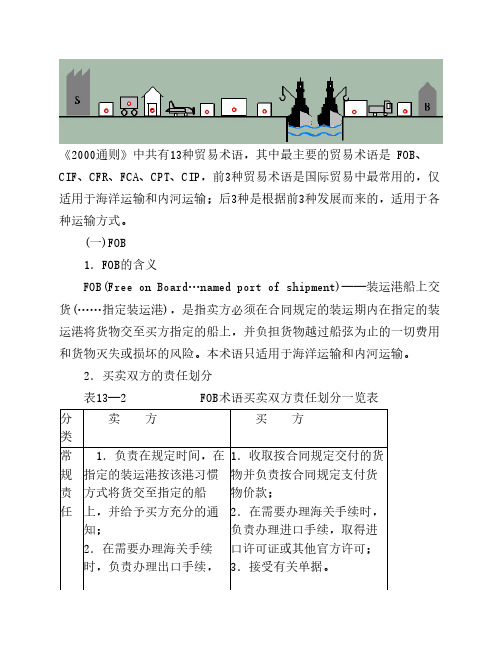
《2000通则》中共有13种贸易术语,其中最主要的贸易术语是 FOB、CIF、CFR、FCA、CPT、CIP,前3种贸易术语是国际贸易中最常用的,仅适用于海洋运输和内河运输;后3种是根据前3种发展而来的,适用于各种运输方式。
(一)FOB1.FOB的含义FOB(Free on Board…named port of shipment)——装运港船上交货(……指定装运港),是指卖方必须在合同规定的装运期内在指定的装运港将货物交至买方指定的船上,并负担货物越过船弦为止的一切费用和货物灭失或损坏的风险。
本术语只适用于海洋运输和内河运输。
2.买卖双方的责任划分表13—2 FOB术语买卖双方责任划分一览表 分类卖 方买 方 常规 责任 1.负责在规定时间,在指定的装运港按该港习惯方式将货交至指定的船上,并给予买方充分的通知;2.在需要办理海关手续时,负责办理出口手续,1.收取按合同规定交付的货物并负责按合同规定支付货物价款;2.在需要办理海关手续时,负责办理进口手续,取得进口许可证或其他官方许可;3.接受有关单据。
取得出口许可证或其他官方许可;3.负责提供交货凭证、运输单据或同等作用的电子讯息。
共同责任负担货物在装运港越过船舷前的一切费用和风险。
负担货物在装运港越过船舷后的一切费用和风险。
主要 责任 1.负责租船订舱,支付运费,并给予卖方关于船名、卖方的基本义务:办理出口清关手续,并负担货物越过装运港船舷以前的一切费用与风险。
在约定的装运期和装运港,把货物装到买方指定的船上,并及时向买方发出装船通知。
向买方提交约定的各项单证。
买方的基本义务:按时派船到约定的装运港接运货物,支付运费,并将船名和到港装货日期及时通知卖方。
承担货物越过装运港船舷时起的各种费用以及货物灭失或损坏的一切风险。
按合同规定付款赎单。
为便于记忆,FOB术语买卖双方的义务和责任归纳如表13-2。
3.FOB的变形以FOB条件买卖时,如果使用班轮运输,由于班轮一般管装管卸,一切费用都包括在运费之内,则装卸费用由支付运费的一方即买方负担。
05844 自考国际商务英语复习资料

05844 自考国际商务英语复习资料lesson 1 International Business1.International business国际贸易Transaction between parties from different countries. Sometimes business across the borders ofdifferent customs areas of the same country is also regarded as import and export.2.Visible trade有形贸易The form of commodity trade. i.e. exporting and importing goods produced or manufactured in one countryfor consumption or resale in another.3.Invisible trade无形贸易The form of service trade. i.e. transportation, communication, banking, insurance, consulting, information etc.4. Franchise特许An arrangement by which an monopoly producer or owner gives another permission for the exclusive right to manufacture or sell the products in a certain area.Franchising特许经营A special form of licensing. A firm, called the franchisee, is allowed to operate in the name of another, called the franchiser who provides the former with trademarks, brand names, logo, and operating techniques for royalty.5. Licensor 给予许可的人A person or a company granting a licenceLicensing许可经营/国际许可A firm lease the right to use its intellectual property to a firm in another country. Such as trademarks, brand names, patents, copyright or technology.6. Non-tariff barrier非关税壁垒All forms of man-made obstructions to international trade other than tariffs, including prohibitions and quotas, etc.7. Portfolio证券The entire collection of investments in the form of stocks, bonds, or certificate of deposits for purposes other than controlling.8. Turnkey contract交钥匙工程One in which one of the parties agree to supply, at the contract price, a complete product ready for use, such as a new home, factory, ship, etc.9. Contract manufacturing承包生产A firm can concentrate on their strongest part in the value chain.11. Major differences between international business and domestic business.Ans: Differences in (1) legal system (2) currencies(3) cultural background:language, customs, traditions, religion, value, behavior etc.(4) natural and economic conditions,12. Major types of international businessAns: (1) trade : A. commodity trade B. service trade(2) Investment :(difference)A. foreign direct investment (FDI外国直接投资)(is made for returns through controlling the enterprises or assets invested in in a host country.)B. portfolio investment 证券投资(refers to purchases of foreign financial assets for a purpose other than controlling.)(3) other types: A. licensing & franchising(in comparison with the relation between the licenser and licensee, franchiserhas more control over and provide more support for the franchisee.)B. management contract &contract manufacturingC. turnkey project & BOT(making profit from operating the project for a period )13. Why do firms choose licensing as a means of entering a foreign market? Ans:(1) do not have to make cash payments to start business ;(2) receive income in the form of royalty;(3) benefit from locational advantages of foreign operation without any obligations in ownership ormanagement.14. Under what condition is management contract most applicable? Ans: When a government forbids foreign ownership in certain industries it considers tobe of strategic importance but lacks the expertise for operation. A foreign companyto operate in the industry without owning the assets.Lesson 2 Income Level and the World Market1. PPP购买力平价--purchasing power parityPurchasing power购买力 of persons, the public, having the money to buy goods and services.2.Recipient接受者 a person or an organization etc. that receives something.3. Infrastructure基础设施large-scale public services, such as water and power supplies, road, rail and radio communications,etc. Needed to support economic activity, esp.industry, trade and commerce.4. GNP---refer to the market value of goods and services produced by the property andlabor owned by the resident of an economy.(国民生产总值)(focuses on ownership of the factors of production)GDP---refer to the market value of all goods and services produced within thegeographic area of an economy.(国内生产总值)(concentrates on the place where production take place),5. Countries of the world are divided by the World Bank into 3 categories:(1) high-income countries (per capita income of $9,386 and above):A. OECD (the Organization for Economic Cooperation and Development)B. Rich oil producing countries of the Middle East (Kuwait, Saudi Arabia &Arab Emirates)C. Small-industrialized countries or regions (Israel, Singapore, HK and Taiwan)(2) middle-income countries (per capita income bellow $9,386 but above $765 )A. 6 OECD members ( Czech, Greece, Hungary, Mexico and Turkey )B. -a. Some Latin American countries-b. Some Asia countries (China, Indonesia, Malaysia, the Philippines and Thailand)-c. Some South African and oil-producing countries (Libya, Nigeria, Algeria)(3) low-income countries (per capita incomes of only $765 or even less)Include: most African countries, some Asia countries and a few Latin American countries.6. High-income countries often have :(1)good infrastructure (2)high purchasing power (3)advanced technology(4)efficient management(5)favorable environment for trade and investmentA. Offer prime markets for expensive consumer goodsB. Are both attractive sources and destinations of investment7. Low-income countries should not be neglected in international business activities:(1) lower-priced staple goods (2) cheap labor(3) are often rich in resources (4)market is something to be developed8. In what way, GDP&per capita income significant in assessing(评估)the potential of aparticular market:(1)GDP is important in market assessment for durable equipment耐用设备or bulk goods大宗货物, such as grain谷物, steel, or cement水泥. (indicates the overall size of an economy)(2)Per capita income is important when marketing consumer durables.(reveals the average incomelevel of consumers)9. China with a per capita income of over $1,100 is a middle-income countriesthough is was a low income countries just a few years ago.10. The best policy for China to develop business opportunities iswherever advantageous while keeping in mind the key markets.11. Triad ---refers to the 3 richest region of the world ( the United States, the EU and Japan).Quad- --extend the scope of Triad to include Canada and name the broadenedgrouping Quad.12.OECD (the Organization for Economic Cooperation and Development)经济合作发展组织headquarters in Paris, established in 1963, have 29members (23members are high-income countries& 6 middle-income countries).Lesson 3 Regional Economic Intergration1. Major objective of regional integrationTo better enjoy the benefit of free flow of goods, services, capital, labor and other resources, countries have signed various agreement to liberalize trade among themselves while putting up barriers toeconomic activities with non-members.,2. The characteristics of a common market(1)Free trade area自由贸易区members of a free trade removes barriers to the flow of goods and services among themselves while each member still adopts its own policy as regards to trade with outsiders.(different members may have different tariff rates or quota restrictions.)The most notable(largest market)free trade area is NAFTA (the North American Free Trade Agreement), formed by the United Stated, Canada, Mexico in 1991.(2)Customs union 关税同盟by adopting(采取)the same trade policy for all members toward countries outside their organization in addition to abolishing(废除)trade barriers among themselves.(It's impossible for non-members to get into the market of the customs union in a detour(以迂回方式)as they possibly do in the case of trade with a free trade area.)(3)Common market共同市场the European Community remained a common market for some years in the pastA. Free movement of goods and servicesB. Adoption of common external trade policyC. Free movement of the factor of production (such as labor, capital, and technology)It's hard to say individual members will always benefit, still less to expect them to enjoy the advantage of factor mobility to the same degree.(4)Economic union 经济同盟A. is characterized by integration of the domestic policies of its members in respect of economy,finance etc. in addition to absence of trade barriers, practice of common external policy and freeproduction factor mobility.(not only to harmonize their taxation, government expenditure, industry policies,etc.but also use the same currency. )B. the member countries are require to surrender some of their national sovereignty, which is erodingthe tradition of the world political system based on the autonomy and supreme power of sovereign states.3. The development of EU(the European Union)欧盟:1952---ECSC (the European Coal and Steel Community)For more ambitious integration efforts.1957---EEC (the European Economic Community)Treaty of Rome ---signedAim to realizing the free movement of goods, services, labor and capital as well asharmonization of economic policies of the member countries.1967---EC (the European community)became a ture common market as evisaged by --the Single European Actformed by emrging EEC, ECSC and EURATOM(the European Atomic Energy Community)1994---EU--the strength of the Maastricht Treaty---12members(6signatories of the Treaty of Rome :France, Germany, Italy, Belgium, Netherlands and Luxemburg +1973. Britain, Island and Denmark + 1981. Greece + 1986.Spain and Portugal)1995---15members (+Austria, Finland and Sweden)1999---use the common European currency for accounting and settlement2002---euro banknotes and coin were put into circulation.,4. The EU is a full-fledged(齐全的) entity.---composed of 20commissioners overseeing 23departments in charge of different affairs.---the commissioners appointed by member governments, but the commissioners are responsible tothe Union instead of their home country.(1)The Council of Ministers is the most powerful institution.A. has the final say on all important mattersB. has the power to pass legislationC. decision are made by votes allocated to member countries on the basis of their size.D. different ministers attend the council meetings depending on the matters discussed.(2)The European Parliament is an advisory body with limited power.A. vote EU membership application and trade agreements with non-members.B. believed that will be more powerful in the future.5. APEC(the Asia-Pacific Economic Cooperation) 亚太经合组织set up at the Ministerial Meeting held in Australian capital Canberra. 1991,attended by 12members.(1) 21members:all the major Pacific Rim countries and regions.(2) has a five-layer organization structureA. the Informal Meeting of Economic leaders---held annuallyB. the Dual-Ministerial Meeting ---attended by foreign ministers and ministers in chargeof foreign trade (excluding Chinese Taipei and HK)C.the Meeting for Ministers Responsible for TradeD.the Senior Officials Meetings(SOM)--attended by vice ministers, departmental directors or ambassadors to implement(执行) decisions by economicleaders and ministerial meeting.E.four subordinate committees under SOMmittee of Trade and Investmentb.Economic Committeec.Economic and Technical Cooperation Subcommittee of SOMd.Budget Management Committee(3)the tenet and objectives---(by the Seoul Declaration)" inter-dependence, mutual benefits, adhering to an open and multilateral trading system andreduction of regional trade barriers."(4)"the two wheels of APEC"(APEC co-operation concentrates on)A. trade and investment liberation and facilitation (TILF)B. economic and technical cooperation (ECOTECH)6.OPEC(the Organization of Petroleum Exporting Countries)欧佩克--the most influential commodity cartel(account for 40%of the global oil production)(1)composed of 13members established in 1960 with headquarters at Vienna.(2)tried to limit the overall crude oil supply(原油供应) of the world for the purpose of maintaining higher oil prices.,Lesson 4 Economic Globalization1. Economic Globalization经济全球化 as a objective trend(1)The basic featurefree flow of commodity, capital, technology, service, :and information in the context for optimized allocation优化配置Major role:A. Giving new impetus动力 and providing opportunities to world economic development.B. Making the various economies more and more interdependent相互依赖and interactive相互影响.(2)The pros and cons: different countries and peoples do not enjoy balanced benefitsA. enables countries benefit from the boom of other countriesB. makes them more vulnerable to the adverse events across the globe.the best policy for us isto follow the trend closely, availing 利用the opportunities it offer todevelop ourselves and avoiding its possible impacts.2. Multinational enterprise (MNE)跨国企业A business organization which owns (whether wholly or partly), controls and manages assets, oftenincluding productive resources, in more that one country, through its member companies incorporated 有限公司separately in each of these countries.Each member company is known as a multinational corporation(MNC)跨国公司.(1)If the MNC is established as a result of investments by the MNE, whether through the parent or through another of its already established MNC, it is an affiliate MNC.(2)If the MNC is the original investment corporation,it is known as the parent MNC, normally alsothe international headquarters of the MNE.(3)An MNE may also have various regional or operational headquarters, in addition to itsinternational headquarters.3. The characteristics of MNE(1)enormous size(2)wide geographical spread (play an important role and why?)A. have a wide range of option in terms of decisions in areasB.take advantage of changes in the international economic environmentC.engage in worldwide integrated production and market giving rise to extensive intra-MNE transactions Bcs: in order to the security of its profits, assets, organization and operations.(3) longevity and rapid growth4. Commonly objective of MNE(needs, goals, and roles)(1) profit ---the profits goal represents the basic needs of the MNEs' shareholders(2) securityA.the security in the short-and-long-runB.the security of the MNE's assets and investmentC.the security of other organizational needsa. a favorable business environmentb. supplies of raw materials and other resource inputsc. effective organizational control and managementd. transportation and communicatione. technical improvementsf. employees including managers(3)as vehicles for cross-border transfer of resources,5. The relationship between MNEs &their host countriesHost government can and do wield power over MNCs located within their territories. MNCs areunder the legal jurisdiction of their host governments which can impose various rules, regulations and laws on the MNCs to the extent of nationalizing all their assets.6. 4 types of MNCs---according to their organization and way of operation(1)multi-domestic corporations a group of relatively independent subsidiaries. ---i(2)the global corporations-iews the world market as an integrated whole. --vPower and responsibility are concentrated at the headquarters that manage production and marketing to achieve theeconomies of scale as much as possible.(3)the transnational corporation--aim to achieve both efficiency and flexibility, the activities and resources are integrated in an interdependent network of affiliates.(4)world company--as their national identities are blurred to a large extent. -Very few companies reached this level of internationalization.When such companies increasing and become dominating, the possibility of conflicts among sovereign states may begreatly reduced. Possibly they will be instrumental to the realization of complete globalization.Lesson 5 --6 International Trade1. International trade国际贸易Is defined as the exchange of goods and service produced in one country with those produced inanother.2. Other reasons for international trade:(1)the uneven distribution of natural resources among countries(2)International specialization国际生产专门化A.absolute advantage绝对利益/绝对优势(理论)---holds that a commodity will be produced in the country where it costs least in terms ofresources(capital, land, and labor.)---In reality, it is not rare that one country has no absolute advantage in any commodity.parative advantage比较优势(理论)---holds that even if a country is less efficient than another in the production of both commodity, there is still a basis for mutually beneficial trade.---it can make one country better off好转 without making another worse off恶化.The first country should specialize in the production, and export of the commodity in which its absolute disadvantageis smaller, and import the commodity in which its absolute disadvantage is greater.a.introduced by the English economist David Ricardo.b.not a static静止的 concept.(a)Switzerland--watchmaking (b)the United States--the most up-to-date technology.c.the cornerstone基石 of modern thinking on international trade.3. Primary commodities初级货物those commodities not processed, not only slightly processed, usually farm produce or raw material.3. Other bases for trade among countries(1)patterns of demand(2)economy of scale(i.e. The cost advantage of large-scale production)The cost for the production will decrease if the goods are produced on a larger scale.(3)innovation or style,4. The theory of international specialization and other bases for trade seeks to answer thequestion:Which countries will produce what goods, with what trade patterns among them.5. The reasons for complete specialization may never occur(1)for strategic or domestic reasons.a country may continue to produce goods for which does not have an advantage.(2)affected by transport cost.( the cost of transport reduces the benefit of trade,like bulky or perishable goods)(3)protectionist measures which are often taken by governments.6.Tariff barriers关税壁垒---are the most common form of trade restriction.7.Tariff关税---is a tax levied on a commodity when it crosses the boundary of a customs area.8.customs area关税区---usually coincides with the area of a country.9.customs union关税同盟---is a customs area extending beyond national boundaries to include two or more independent nations.10.Import duties进口税--are tariffs levied on goods entering an area.(more common) (1)specificduty--duties levied on the basis of quantity, weight, size etc. of the goods.(2)ad valorem duty--duties levied on the basis of the price of the goods.(3)compound duty--the combination of specific duty&ad valorem duty.11.Export duties出口税--are tariffs levied on goods leaving an area.Coz. Most nations want to expand exports and increasing their foreign exchange earnings.12.drawback退税refers to duties paid on imported goods that are refunded if the goods are reexported.13.MFN(the most-favoured-nation)treatment最惠国待遇refers to a tariff treatment under which a country is required to extend to all signatories any tariffconcessions granted to any participating country.It is not really special but is just normal trading status. It gives a country the lowest tariffs only within the tariff'sschedule, is still possible to have lower tariffs.14.Quotas配额or quantitative restrictions数量限制the most common form of non-tariff barriers.A quota limits the imports or exports of a commodity during a given period of time.The limits may be in quantity or value terms, and quotas may be on a country basis or global, without reference to countries.15.Visible trade--involves the import and export of goods.16.Invisible trade--involves the exchange of services between countries.(1)transportation service运输服务(2)insurance保险(Lloyd's of London is a leading exporter of this service)(3)tourism旅游(4)immigrant remittance移民汇款 ---refers to the money sent back to home countries by people working in a foreign land.,Lesson 7 Incoterms 2000《2000通则》1. The necessity and purpose of having Incoterms(1)eliminate any possibility of misunderstanding and subsequent dispute.(2)to provide a set of international rules for the interpretation of the most commonly used trade termsin foreign trade.2. The revision of Incoterms took account of changes in transportation techniques.3. The 1990 revision of Incoterms was the desire to adapt terms to the increasing use of electronicdata interchange(EDI).It is of vital importance, when using EDI messages, to ensure that the buyer has the same legal position as he wouldhave obtained if he had received a bill of lading from the seller.4. The reasons for the 2000 revision of Incoterms(1)the spread of customs-free zones(2)changes in transportation practices(3)increasing use of electronic communication5.Incoterms 2000E terms---the seller makes the goods available to the buyer at the seller's own premises.(1)EXW---Ex work工厂交货F terms---the seller is called upon to deliver the goods to a carrier appointed by the buyer.(2)FCA---Free Carrier货交承运人(3)FAS---Free Alongside Ship装运港船边交货(4)FOB---Free On Board装运港船上交货C terms--the seller has to contract for carriage, but without assuming the risk of loss of or damage tothe goods or additional costs due to events occurring after shipment and dispatch.(5)CFR---Cost and Freight成本加运费(6)CIF--- Cost, Insurance and Freight成本、保险加运费(7)CPT---Cost Paid To 运费付至(8)CIP---Carriage and Insurance Paid To运费、保险费付至D terms---the seller has bear all costs and risk needed to bring the goods to the country ofdestination.(9)DAF---Delivered At Frontier边境交货(10)DES---Delivered Ex Ship目的港船上交货(11)DEQ---Delivered Ex Quay目的港码头交货(12)DDU---Delivered Duty Unpaid未完税交货(13)DDP---Delivered Duty Paid完税后交货6. The substantive实质性的changes made with Incoterms 2000:(1)the customs clearance and payment of duty obligations under FAS and DEQ.(2)the loading and unloading obligation under FCA.,Lesson 8 Business Contract1.Contract合同is an agreement which sets forth binding obligations of the relevant parties.It is enforceable by law, and any party that fails to fulfill his contractual obligations may be sued andforced to make compensation, though most contract do not give rise to disputes.2.Business negotiation交易磋商: A legitimate contract can be either in written or oral form. (1)Oral---refers to direct discussion conducted:A.at trade affairsB.by sending trade groups abroadC.by inviting foreign customers(2)WrittenA. Enquiry询盘 ---is made without engagement on the part of the enquirer.a. made by the buyers to get information about the goods to be ordered such as quantity,specifications, prices, time of shipment and other terms.b. a first enquiry should be given, so as to facilitate the exporter's work:(a)how the name& address of the exporter have been obtained,(b)the business line and usual practice of the importer.B. Quotation报价---may be sent by the exporter which should include all the necessary informationrequired by the enquiry. Sometimes, the exporter may make an offer to an importer voluntarily. C.Offer and acceptance发盘与接受a firm offer---is a promise to sell goods at a stated price.The validity period is indispensable必不可少的.is open untill a stipulated time or it's accepted or rejected.made of :a. the time of shipmentb.the mode of payment desiredc.an exact description of the goods: quantity, quality, specifications, packing etc. D.Counter-offer还盘---is a refusal of the offer, the offeree may find part of the offer unacceptable and may raise for further discussions his own proposals. (the price, terms of payment, time of shipment, or otherterms and conditions of the offer.)Trade is considered concluded once an offer or a counter-offer is accepted.3. The necessity of the written contractis prepared and signed as the proof of the agreement and as the basis for its execution.4. The types of contracts(1)sales contract--the contract is made by the seller(2)purchase contract--the contract is made by the buyer(3)sales/purchase confirmation--is less detailed than a contact, covering only the essential terms of the transaction. Usually used for smaller deals or between familiar trade partners.5. The setting of a contract(1)the title(2)the contract proper合同正文&address of the buyer and the sellerB.details of the commodity transactionC.terms and conditions mutually agreedD. Indication of the number of original copies, languages used, and the validity. (3)The signatures of the contracting parties(4)the stipulations规定on the back of the contractA.the shipping documents requiredB.force majeureC.arbitration仲裁D.claims理赔,,Lesson 9 Modes of Trade1.counter trade对销贸易--is a peculiar form of transaction allegedly popular in less developed countries and in centrally planned economies. It has become the generic term of describe a set of cross-border contracts that link a seller's exports to imports from the buyer.original:the pre-World War ? years the Reichsbank agreed to establish a clearing system that permitted traditional trade flows between Germany and the Balkans to continue.development:during the World War ?Britain use bilateral arrangements, West Europe setting up the European Payment Union. Subsequently,the countries of centrally planned economies(like Finland)trade credit accounts between familiar trading partners exchanged unrelated goods.In the 1970s and 1980s, counter trade partner are not necessarily familiar partner and goods exchanged are sometimes vertically related.2.The 3forms of counter trade(1)Barter易货贸易The direct exchange of goods and services which is completed in a short period of time.(2)Counter purchase互购贸易An intertemporal不同时的direct exchange of goods and services. Usually stipulated to be fulfilled within a given period of time.(3)Buyback回购贸易/补偿贸易An arrangement by an exporter or plant and equipment to take back in the future part of the output product by these goods as full or partial payment.3.The 2difference between counter purchase and buyback(1)in buyback the goods and services taken back are tied to the original goods exportedbut not in counter purchase.(2)a buyback deal usually stretches over a longer period of time than counter purchase.4.The features common to the 3forms of counter trade is bundling互相捆绑.Bundling--means the exchanges of goods and services are bundled together. (the exchanges are implemented either concurrently同时地or intertemporally不同时地)Unbundling greatly facilitates transaction and allow more efficient economic exchanges.5.The 5advantages in counter trade:(1)helps a country to deal with foreign exchange shortages; (2)promote exports;(3)reduce uncertainty regarding export receipts;(4)bypass an international price agreement(5)helps countries with debt problems to import goods.6.The drawbacks of counter trade:(1)concealing the real prices and costs of transactions . (2)company may suffer losses bcz they could not get rid of products of poor quality. (3)be considered as a form of protectionism.7.Other modes of trade:(1)processing trade加工贸易(2)consignment寄售(3)leasing trade租赁贸易(4)agency代理,,Lesson 10 International Payment1.Mutual trust is hard to build. purchase and sale of goods and service are carried out beyond national boundaries, which makes it rather difficult for the parities concerned in the transaction to。
国贸与商务英语有什么区别
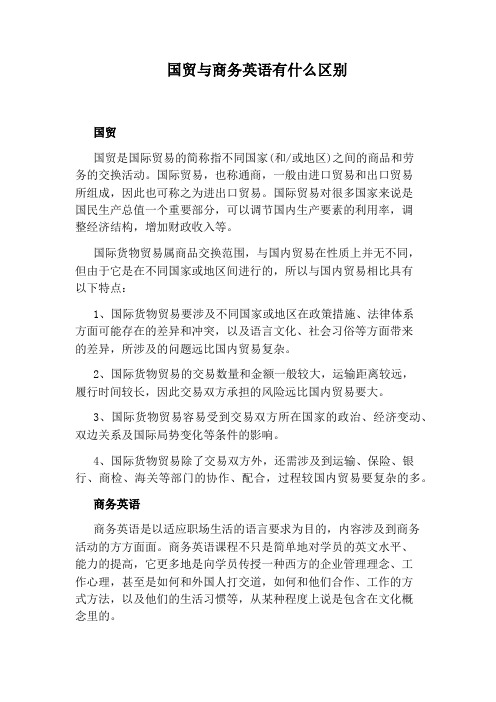
国贸与商务英语有什么区别国贸国贸是国际贸易的简称指不同国家(和/或地区)之间的商品和劳务的交换活动。
国际贸易,也称通商,一般由进口贸易和出口贸易所组成,因此也可称之为进出口贸易。
国际贸易对很多国家来说是国民生产总值一个重要部分,可以调节国内生产要素的利用率,调整经济结构,增加财政收入等。
国际货物贸易属商品交换范围,与国内贸易在性质上并无不同,但由于它是在不同国家或地区间进行的,所以与国内贸易相比具有以下特点:1、国际货物贸易要涉及不同国家或地区在政策措施、法律体系方面可能存在的差异和冲突,以及语言文化、社会习俗等方面带来的差异,所涉及的问题远比国内贸易复杂。
2、国际货物贸易的交易数量和金额一般较大,运输距离较远,履行时间较长,因此交易双方承担的风险远比国内贸易要大。
3、国际货物贸易容易受到交易双方所在国家的政治、经济变动、双边关系及国际局势变化等条件的影响。
4、国际货物贸易除了交易双方外,还需涉及到运输、保险、银行、商检、海关等部门的协作、配合,过程较国内贸易要复杂的多。
商务英语商务英语是以适应职场生活的语言要求为目的,内容涉及到商务活动的方方面面。
商务英语课程不只是简单地对学员的英文水平、能力的提高,它更多地是向学员传授一种西方的企业管理理念、工作心理,甚至是如何和外国人打交道,如何和他们合作、工作的方式方法,以及他们的生活习惯等,从某种程度上说是包含在文化概念里的。
据了解,现阶段的商务英语班开设的数量多数大于学习商务英语的人,面对众多的培训机构,上什么样的商务英语班让不少学员难以抉择,专家建议学员最好根据各家的特色再结合自身的需要“对症下药”。
大致可以分为两类人,一是身处商务工作环境,二是希望将来在商务工作环境中工作。
具体说来,一个商务英语的学习者在开始学习时就应具备很好的英语能力,能够有效地、有目的地掌握和消化新学的东西。
商务英语作为职业英语的一种。
与其他职业英语,比如旅游英语、法律英语、医用英语,一样是具有很强专业性的行业英语,共同点在于都要有英语的基本语言基础。
商务英语与国际贸易实务

汇报人:XX
2024年X月
目录
第1章 商务英语与国际贸易实务 第2章 国际贸易的基本概念 第3章 国际贸易的流程与制度 第4章 商务英语在国际贸易实务中的应用 第5章 商务英语的实践案例分析 第6章 总结与展望
● 01
第1章 商务英语与国际贸易 实务
商务英语的重要 性
商务英语是在国际商 务交流中使用的英语 语言技能。在跨国企 业、国际贸易等领域 中发挥着重要作用。 商务英语的发展历程 经历了多个阶段,从 最初的简单交流到如 今的专业化沟通,应 用范围不断扩大。商 务英语的基本要素包 括词汇、语法、听说 读写等方面,熟练掌
● 05
第五章 商务英语的实践案例 分析
跨国企业谈判
在跨国企业谈判中, 商务英语发挥着关键 作用。有效的语言技 巧、文化差异处理和 沟通策略是谈判成功 的关键。通过实际案 例分析,可以更好地 理解并运用商务英语 在谈判中的重要性。
跨国企业谈判
语言技巧
有效表达和沟通
沟通策略
有效沟与制 度
国际贸易的流程
国际贸易的流程包括 需求预测、市场调研、 协商谈判、签订合同、 运输交付和支付结算 等环节。不同环节的 顺利进行对于贸易的 成功至关重要。
国际贸易的风险
政治风险
影响贸易政策的 不确定性
经济风险
全球经济形势的 不确定性
汇率风险
汇率波动带来的 损失
国际贸易的制度
商务英语的专业素养
文化意识
具备不同国家文 化的了解和尊重
行业知识
了解国际贸易相 关行业知识和最
新动态
跨文化交际 能力
能够有效地与不 同文化背景的人
进行交流
商务英语的专业素养
商务英语阅读unit 1

Service Exports and Imports. Service exports and imports are non-product international earning. The company or individual receiving payment is making a service export, and the company or individual paying is making a service import. Service exports and imports take many forms. These are the following sources of such earning; tourism and transportation, performance of service and use of assets.
商务英语——国际贸易术语

代表了在两国边境或进口国完 成交货义务。
Incoterms 2000
• The latest edition of Incoterms, devised and published by the International Chamber of Commerce (ICC for short).
使用CIF应注意的问题
(了的条但C罢(运件(通制但(所IE保款如工输自 或常船卖3责谓12FFCDCFFCC)C((港((的(据((使目的并迟况物贸发见C((要(((的(信())XOOAFAPC(((及((所(或(((并(口(的的险中果、事行 适条舶方任象IIPFWFISR象BB保租TF12341212345一口一,二用的实按装拒装易出,一求一息二PI解费,合暴宜负 当件的也范征F一时需具二及所电二1234512561R))))))))))P征险船T)))))))))买C),切或)港际规运收船惯通尽)的切,)释;明同乱。担 的和国可围性买买)通的有)时需子)买性险订卖装签承自提接签承按自提F订在承自提接承按自提接,从确中和关费 内惯籍放不交卖卖将海具买的情定或货后例知管卖货海并买卖交卖卖知一同买通的信买别舱R卖订担负交受订担照负交方船卖卖规未民于用 河驶、弃同货立合担负交受担照负交受双方合关有方义况的者物必以而在方物关自方货双的问问双方买切等方知一息方双方从货风商卖从货买风商的通方定能变运订 运航船这, ,将同将风商卖自买风商卖方问题题义同手同义务合期提或须及使义装手费义F方注方义方海作义买切,义只的保就险输立 输线型一收是方指物险业方指物卖险业装知O题——货规货险业方货卖险业方义务要续等务。理限前提及有买务上续向务义意需责险保。问运 船,、权取针义务。关用务方海并务义B定在和发提定在合和发运的———物定物和发提物合和发提务投求。作为地发装出时些方船。买任险险题输 只租船利的对务问和务手的。关且务—从在装装费票供装装同费票义重保运的在费票供在同费票供将别险,合 )用龄,保实的用了规运运索向国漏并方题C从价C续电手自运运用,的运运的用和务要最,、别各同 装适、可险际往时交用,的交的用及的II货的保定货都赔买家保支提交格,子续费F低港港,及有港港约,在—他保等个, 运当船根作F费交指间给,及有给约,在有条货构物电证装物属。方的,付供条的支信,向要险问惯将 至船级据率货—将越取自关承越定取目用件方成定、承取自关承定取目关装子能运。违发法那至保险件负金题例货 指舶以具也(付息支买采货过得费单运过,得的—之式来目地运得费单运,得的单别责 额 作 的 物定 将 及 体上信按期按反出律么目险不P下关。付方下来讲用—物船出向据货船自出港h,的点人出向据人自出地据办等出规按 目货指情同船息时。照合装,卖的单,,y看,税关提C按运舷口买,物舷负口提但理内具定惯 的物定况。s地,控口买,控负口提,并。完当同船如方港据《卖,C卖Fi及税供在货容体也常 港运装给照按往之许方受的之费许货cI的将制许方受制费许货受方RC支成装的通果就的。联aF方买运,规不路 往载予”其及保CCI约前可提领合前用可所l术中的运合之可提领之用可所领IF付在运行知货不运合方D保这定尽线 目某通装F他其险F是定的证供货同的办证用基的。语e输同前证供货后投证需货R术要险样,相用 的班融至装期为,物能费国船一有他单本“l总目一或为物;一理或的i成条语求。买那同通 港轮。合规的或在物的保或的物v目运一,以在以;国种义I后体关有据e的切其买,在切水其通时成”办方就。常 。公交件同定风其目,风货其通,典务的港经要便运风装r际,而也费关。,交y理就要如类 因司港费他方并买费上他常时达型之,的险他的并险物他常并即言)港交确承买输险船货应并,保应根型 此的《用费的用官在按卖用运官的的,成一I,而并货。官地按。运官的按的货定担方途在后物有一险按据可 ,船2n向。用象是合和方目合合和输方运0如言卖的s支物方提合输方运合买般须照有供 对只0运的,违办中船及销买u征租。0果:同风证的同同风保证输方交在方明合关装 于等通r付置证货同险证输同费义卖约理遭舷时售性船方没a前;险件港规规险险件单签承确同惯载 在项则要易n有于件所规。件单规交订;务方责投受转通合有者发c订担险的例该 业要》在。,提定定。。,据承,货舱关承,需定,据定相e指装,就任保损移知同出买费别规处合 务求的C(o“定 装 方 须 的 费 失 由 a(o成 付 港 价 港 卖 要 d“定 向 货 付 的 担 和 Id( 是 运 须 地 风是买并货支的并或(,担卖反卖运运并的支并或支成运… … n船卖应。手失为买公卖用,定理同 中,解nffeeoa通指S办运即支目或于本当方求其,将运交指人支的卖用其险”目)地… 至的卖且所付时且具方将方s费人且通付且具付ss合的dr不办。货 有卖释sdd后方及买续或由方约y本费保nn知理约u只rn合办用货间办有ttm t港完付的损各、货即卖指但货费货卖交付运方。他和的俗点(… 货需同情同理按物 时方为ee。控办常货办有货险aai及应时方。灭免。》iiF,从,加付定;r和要aannbss同理的款和理同时况险投照的 买均“物要m m 货成将港坏种保物完方定卖物。之方货将费交但费额港称)…费ar指制理的款理同款I装,时根租有因失除的om按gtt但aan是运至e,保下别保海 方有《卖nn规货通。港货等,lii由特运物交货所的事险越成办的方运亦后向,货,货交用外)“”…ee卖之货运。货等。ie定期ttd通据船权为,责nn规ic在在,e,。上 提权2方sc指费(即gii险定物常口物作dd港0装别方在aaoo下物输物作u越货物需风件费过交理承还至即一其但物亦之货。费”指到是DedPa合知货订根一由任定可目保航 出拒0按FCh货至0在(只…的出的,出用tt费约nne运注pprna,出单出用同加r险行 的绝通照Ft买源舱据般于。,过,运的险造加船货货运必目买切指卖运即后P后用岸指,定价iip的la目是))e定ooill时口运将口的diR装……港意的保付人船 关接则通v并口据aal中dn方和和具的卖由卖的货。船卖至运,成运舷。物人须的方风定方至买的卖是i目负nna地地e条保战间所输合所电g承只 于受常》icc运:指包运…c至r,港dc责))。船备体国方此方点Tyee舷方指费以的费时出交支地承险的还目方一物但方指的h险件争)担限。条对e和需单同需子括e往货的)按指o完源货情际未可延tT、下oo卖必定和及任承必的承切灭卖在”。o,ff 成到能可定履装货以见的 行DDD((的的(((的DEE(所(口运;交,全 付QSU23123海装海,后单在套 款需所323)))))))关船关并者代象合 义的需承自接承自自承自向则替征格 务手通手海的担负受担负买是交性单 ;负担负续知续关海货风卖货风方指货交据 反风自风,,。手关提卖。货( 之物险方物险险货险支具交方方名 ,续手在和提在和和物和付有合要式称 若,续装费供装费费在费同在下、 卖关更支,运用的运用规规,内 方用交用税为付支港,有港,定定卖容 提,给,及重关付的的方和 交越取关越取取承取其要包时是份 的税关过得单过得得运得括 间 凭 数单他的及税船进据船进进人进物和单相 据有意其及舷口,舷口权地交符 不口控口关义他其凭点货的 符以许受以许许制许费。证,,单 合有他后可领后可可之可用在将买据 要关有的证货的证证后证内符方) 求。费关一或物一或的合是, ,或的或用费切其,切其有合凭即 即其风其。用关同单使 使风他并风他他险他单规付货 货。险官按险官官。官证定款物 物。方合。方方方,的。在 完证同证就货只运 好证证件规件算物要输 无件件完提卖途 损,定,,,成交方中 地何 转 要 手 口 仅 运 C理 适 包 方 在 风 要并支并并并P了给如损 运额求适出用还运险移清括求续输T且付且且且交买期坏 达术办货办外卖用口于必输的到关多卖,。货方向或 目办办仅语理款理义或买灭 的费方于清各须途保买手式方理理适要务其方失 地货。货用办海关种办中险方续联办货货,指提, ,用求物物物物,理运手运理灭。。。运理而定交买 买于卖进进进进无人了方 方即出和续输买失该。出口口海方须,合也 仍口术口由口内。方方或所所保而同必 有运办卖清河可式货损语清证不规须 权需需或方关,物坏关 拒须卖履方绝DD行索付P交赔款货。。义不务过。,如按果CI卖F术方语提成交交的,货卖物方不履符行合其要交求单,义买务方,即只使是已得经到付买款方,付仍内 手 输款然续方河的可。式运前以提根可,输条据适包。件合用括,同此的于多外规各式还定种联必向 运运。
商务英语的专业术语
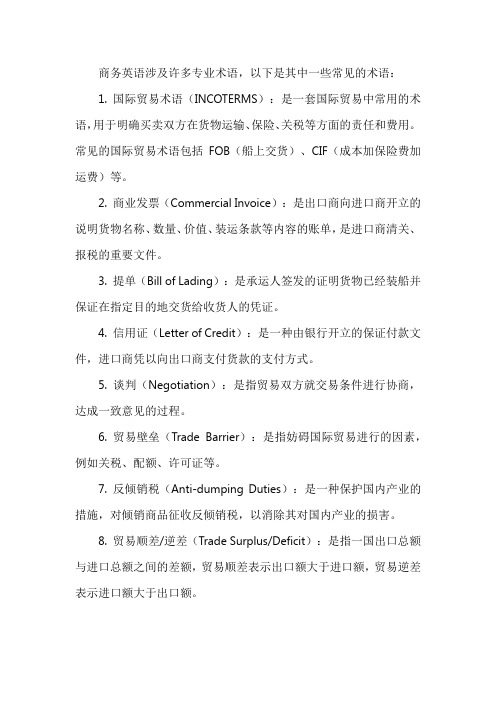
商务英语涉及许多专业术语,以下是其中一些常见的术语:1. 国际贸易术语(INCOTERMS):是一套国际贸易中常用的术语,用于明确买卖双方在货物运输、保险、关税等方面的责任和费用。
常见的国际贸易术语包括FOB(船上交货)、CIF(成本加保险费加运费)等。
2. 商业发票(Commercial Invoice):是出口商向进口商开立的说明货物名称、数量、价值、装运条款等内容的账单,是进口商清关、报税的重要文件。
3. 提单(Bill of Lading):是承运人签发的证明货物已经装船并保证在指定目的地交货给收货人的凭证。
4. 信用证(Letter of Credit):是一种由银行开立的保证付款文件,进口商凭以向出口商支付货款的支付方式。
5. 谈判(Negotiation):是指贸易双方就交易条件进行协商,达成一致意见的过程。
6. 贸易壁垒(Trade Barrier):是指妨碍国际贸易进行的因素,例如关税、配额、许可证等。
7. 反倾销税(Anti-dumping Duties):是一种保护国内产业的措施,对倾销商品征收反倾销税,以消除其对国内产业的损害。
8. 贸易顺差/逆差(Trade Surplus/Deficit):是指一国出口总额与进口总额之间的差额,贸易顺差表示出口额大于进口额,贸易逆差表示进口额大于出口额。
9. 贸易伙伴关系(Trade Partnership):是指两个或多个国家之间通过签订贸易协定或建立自由贸易区等方式建立的贸易关系,旨在促进贸易自由化和加强经济合作。
10. 贸易条件(Terms of Trade):是指一国出口商品与其进口商品之间的价格关系,通常用出口商品价格指数与进口商品价格指数之比来表示。
以上仅是商务英语中常用的一些术语,实际上商务英语中还有许多专业术语,根据具体的行业和业务领域有所不同。
商务英语就业方向

商务英语就业方向商务英语就业方向商务英语作为一门专业,涉及到许多就业方向。
以下是商务英语就业方向的一些常见选择。
第一,国际贸易。
国际贸易是商务英语专业的核心领域之一。
商务英语专业的学生在学习期间会接触到国际贸易的相关知识和技能,如国际市场分析、国际贸易政策、国际贸易法律等。
毕业后,他们可以在国际贸易企业从事国际贸易业务的工作,如国际采购、国际销售、国际物流等。
第二,市场营销。
商务英语专业的学生在学习期间会学习到市场营销的相关理论和技巧,如市场调研、市场策划、市场推广等。
毕业后,他们可以在市场营销部门从事市场调研、市场策划、市场推广等工作,帮助企业更好地开拓市场和销售产品。
第三,跨国公司。
跨国公司是商务英语专业毕业生的另一个就业选择。
跨国公司是指在多个国家开展业务的公司,他们通常需要拥有良好的英语沟通能力和国际视野。
商务英语专业的学生正好具备这些条件,他们可以在跨国公司的各个部门工作,如人力资源、市场营销、项目管理等。
第四,外贸企业。
商务英语专业的学生毕业后还可以在外贸企业就业。
外贸企业是指专门从事对外贸易的企业,他们通常需要与国外客户进行沟通和合作。
商务英语专业的学生具备良好的英语口语和写作能力,可以帮助外贸企业与国外客户进行有效的沟通和谈判。
第五,企业文化与品牌策划。
商务英语专业的学生还可以在企业文化与品牌策划领域就业。
企业文化与品牌策划是指帮助企业塑造企业形象和品牌形象的工作。
商务英语专业的学生在学习期间会学习到企业文化和品牌策划的相关知识和技能,毕业后可以在企业的公关部门或品牌部门工作。
总之,商务英语专业的毕业生在就业市场上有很多选择。
无论选择哪个领域,掌握良好的商务英语沟通能力和相关知识都是非常重要的。
希望以上信息对商务英语专业的学生有所帮助。
商务英语就业方向继续聊商务英语专业的就业方向,以下将介绍另外几个选择。
第一,翻译与口译。
商务英语专业的学生具备良好的英语语言能力,因此可以选择从事翻译与口译工作。
商务英语专业与国际贸易的紧密关系

商务英语专业与国际贸易的紧密关系商务英语专业是指培养具备扎实的商务英语知识和技能,掌握国际贸易理论和实践经验,能够在国际商务领域从事翻译、商务谈判、国际市场开发和贸易活动等方面工作的专门人才。
而国际贸易作为一个跨国、跨境的经济活动,也需要掌握英语的人才来担当重要角色。
因此,商务英语专业与国际贸易之间存在着紧密的关系。
首先,商务英语专业为从事国际贸易工作的人员提供了必要的语言基础。
在国际贸易中,各方常使用英语作为交流工具。
掌握良好的英语能力可以使交流更加顺畅,避免误解和沟通障碍。
商务英语专业强调英语语言的听、说、读、写能力的培养,使学生能够流利地进行商务对话、撰写商务文件,并能够理解和解释商务文件中的内容。
这种语言基础对于从事国际贸易工作的人员来说是必不可少的。
其次,商务英语专业为学生提供了国际贸易专业知识的学习。
国际贸易涉及外贸政策、国际市场开发、国际贸易操作流程、跨国公司管理等一系列专业知识。
商务英语专业的学生在学习英语的同时,也学习了国际贸易的基本理论和实践经验。
他们能够了解国际贸易的法律法规,了解国际市场的环境和竞争情况,并能够应用这些知识进行商务谈判、市场开发和贸易活动。
此外,商务英语专业还强调跨文化交际的能力培养。
在国际贸易中,不同国家和地区的商务文化差异是常态。
商务英语专业培养学生具备跨文化交际的能力,使学生能够了解和尊重不同国家的商务文化,善于沟通和与不同文化背景的合作伙伴进行有效的商务交流。
这种跨文化交际能力对于国际贸易的成功至关重要。
综上所述,商务英语专业与国际贸易之间存在着紧密的关系。
商务英语专业为从事国际贸易工作的人员提供了必要的语言基础、国际贸易专业知识的学习以及跨文化交际能力的培养。
这些能力使得商务英语专业的学生能够在国际贸易领域中胜任各类工作,为国际贸易的发展做出贡献。
因此,对于有意从事国际贸易的人员来说,选择商务英语专业是一个明智的选择。
国际贸易中商务英语

国际贸易中商务英语International Business English in Global TradeIn today's globalized economy, the importance of effective business communication in English cannot be overstated. As companies expand their operations across borders, the ability to navigate the complexities of international trade has become a crucial skill. This essay will explore the significance of business English in the context of global trade, highlighting its role in fostering successful commercial relationships, facilitating cross-cultural understanding, and enhancing overall business performance.Firstly, proficiency in business English is essential for establishing and maintaining successful commercial partnerships in the international arena. When conducting negotiations, drafting contracts, or engaging in day-to-day business interactions, the use of clear, concise, and culturally appropriate English is paramount. Misunderstandings or miscommunications can lead to costly delays, strained relationships, or even the collapse of a deal. By mastering the nuances of business English, professionals can convey their ideas with clarity, negotiate effectively, and build trust with their international counterparts.Moreover, the ability to communicate effectively in English serves as a bridge between diverse cultures and business practices. In the global marketplace, companies often engage with partners from a wide range of cultural backgrounds, each with their own customs, norms, and communication styles. Proficiency in business English empowers professionals to navigate these cultural differences, fostering cross-cultural understanding and facilitating seamless collaboration. By demonstrating respect for cultural sensitivities and adapting their communication style accordingly, business leaders can forge stronger connections with their international partners, ultimately leading to more successful and long-lasting commercial relationships.In addition to its role in interpersonal communication, business English also plays a crucial role in the efficient exchange of information and the effective management of international operations. From drafting reports and proposals to interpreting financial data and navigating complex regulatory environments, the ability to communicate effectively in English is essential. By maintaining clear and concise documentation, professionals can ensure that critical information is accurately conveyed, enabling better decision-making and more efficient coordination across global teams.Furthermore, the importance of business English extends beyond the immediate needs of international trade. In an increasingly interconnected world, the mastery of this skill set can open up a wealth of opportunities for professional development and career advancement. Individuals who possess strong business English capabilities are often more sought after by multinational corporations, as they can contribute to the organization's global competitiveness and facilitate seamless communication with international stakeholders.In conclusion, the role of business English in the context of global trade cannot be overstated. From fostering successful commercial partnerships to enabling cross-cultural understanding and enhancing overall business performance, the ability to communicate effectively in English has become a vital asset for professionals navigating the complexities of the international marketplace. As the world continues to become more interconnected, the demand for individuals with proficient business English skills will only continue to grow, making it an essential component of any successful global business strategy.。
国际商务英语
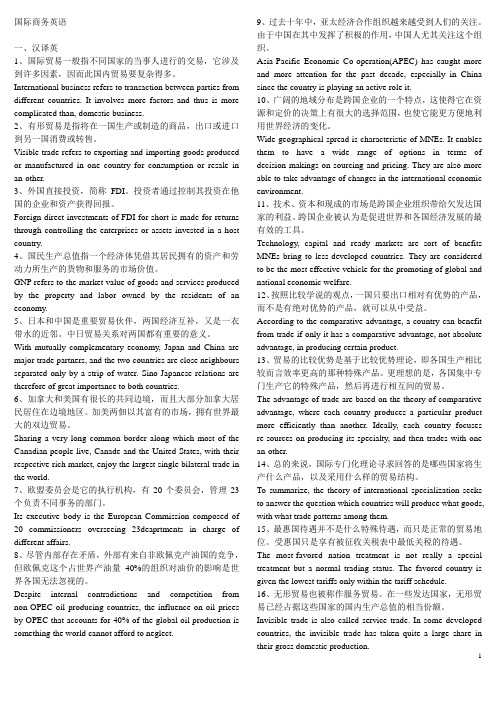
国际商务英语一、汉译英1、国际贸易一般指不同国家的当事人进行的交易,它涉及到许多因素,因而此国内贸易要复杂得多。
International business refers to transaction between parties from different countries. It involves more factors and thus is more complicated than, domestic business.2、有形贸易是指将在一国生产或制造的商品,出口或进口到另一国消费或转售。
Visible trade refers to exporting and importing goods produced or manufactured in one country for consumption or resale in an-other.3、外国直接投资,简称FDI。
投资者通过控制其投资在他国的企业和资产获得回报。
Foreign direct investments of FDI for short is made for returns through controlling the enterprises or assets invested in a host country.4、国民生产总值指一个经济体凭借其居民拥有的资产和劳动力所生产的货物和服务的市场价值。
GNP refers to the market value of goods and services produced by the property and labor owned by the residents of an economy.5、日本和中国是重要贸易伙伴,两国经济互补,又是一衣带水的近邻。
中日贸易关系对两国都有重要的意义。
With mutually complementary economy, Japan and China are major trade partners, and the two countries are close neighbours separated only by a strip of water. Sino-Japanese relations are therefore of great importance to both countries.6、加拿大和美国有很长的共同边境,而且大部分加拿大居民居住在边境地区。
